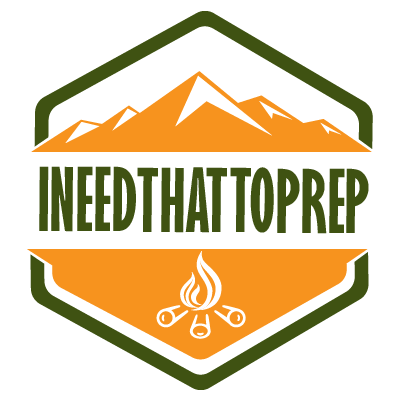Last Updated on May 13, 2023 by Lisa Vargas
Preparation is always the key to surviving whatever life throws at you. Some people try to be prepared for short-term situations because they usually think along the lines that life will go back to normal quickly.
You’re probably horribly underprepared if you can only survive for one or two days without electricity or if you can just run to the shop to get food. Like the majority of people, you probably don’t have a lot of money to spend on things you won’t need right away.
That’s why it can be all too easy to push survival preparations to the backburner. But you can take care of your survival needs even if you’re on a budget. You just have to do it piecemeal and follow through with your plans.
This post will outline some of the things that I personally did when I first got started on my prepping journey to help save money. Believe me. It’s not cheap, but if you take it all at a steady pace, you will come out in the end satisfied and prepared for anything that comes your way. So let’s dive in!
Tip #1: Make a Plan So You Don’t Buy Haphazardly
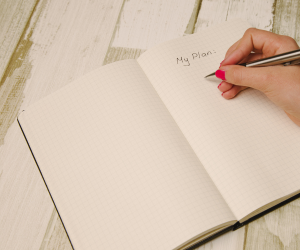
One common mistake among novice preppers is a lack of familiarity with proper survival prepping. This often leads to missteps in acquiring the necessary supplies for you and your family.
Prepping involves ensuring you have enough provisions to endure a crisis that disrupts everyday life, but it doesn’t mean mindlessly filling your shopping cart at a bulk warehouse store. To be successful in your survival preparations, careful planning is essential.
Instead of aimlessly buying items, create a checklist of what you need. Begin with the most critical items that are indispensable for survival. Starting with a basic food and water supply is crucial since these are fundamental necessities.
Consider initially aiming for a three-day stockpile of food and water for each family member, including pets. Look for emergency water pouches labeled specifically for survival situations. These pouches, available in three-day supplies, provide a solid foundation for your initial goal. Focus your plan on setting aside supplies for 72 hours before expanding further.
Once your water supply is secured, shift your attention to food provisions. Opt for emergency food bars that offer around 400 calories per bar and come in various flavors. These bars can serve as your three-day food supply for each person.
Remember, it’s perfectly normal to start with short-term goals and gradually build toward a long-term supply.
Tip #2: Be Selective With Your Splurges

During the prepping process, it’s easy to get carried away and believe that certain items are essential. This mindset can lead to unnecessary splurges, depleting funds that could be better spent on critical supplies. It’s crucial to exercise discernment when determining where to allocate your resources.
Certain items warrant splurging, especially those crucial for immediate evacuation. When the need arises to leave your home swiftly, you must have a reliable way to carry a three-day food and water supply. Invest in sturdy bug out bags made of durable, water-resistant material. Look for bags with excellent load-bearing capacity.
Another area to consider splurging on is communication devices. During a crisis, reliable communication is invaluable for staying informed and connecting with loved ones. Consider investing in ham radios, world band radios, or shortwave radios. Prioritize purchasing a quality antenna and a solar charging system.
On the other hand, exercise caution when it comes to items that offer minimal value or can’t be easily transported during emergencies. For example, a camp stove is essential, but you don’t need one loaded with excessive features. A $20 stove performs just as well as a pricier alternative. Be selective with your purchases to ensure you get the most bang for your buck.
When it comes to eating supplies, it’s wise to invest in heirloom seeds. These seeds serve as the foundation for your long-term survival garden and ensure a sustainable food source for the future.
Tip #3: Buying in Bulk to Reduce Costs
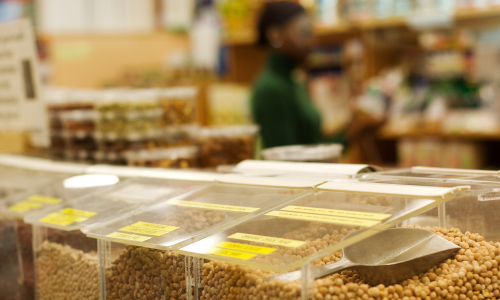
Typically, when purchasing supplies for everyday needs, it makes sense to buy what you require until you can restock. However, when it comes to survival prepping, buying in bulk offers significant cost savings.
Retail and online stores often provide better deals on supplies when purchased in larger quantities. For example, you might pay around $15 for a month’s supply of emergency survival food bars. However, buying them in bulk could land you a deal where you only pay $70 for a six-month supply, saving you $20 in the process.
Bulk buying is particularly advantageous for staple items. Stocking up on water, food, and seeds in bulk can significantly reduce costs. Purchasing a year’s worth of seeds, for instance, is more economical than buying them for just a few months. By saving a little bit of money each paycheck, you can save up for larger bulk purchases.
Always look for sales and discounts that allow you to buy items in bulk at reduced prices. Many stores offer double coupons or bulk purchase deals on items essential for prepping. Learn from avid couponers who know the art of saving money.
To ensure efficient bulk buying, maintain a checklist to track the quantities of each item you possess. Begin with the essentials, such as purchasing large bags of rice (usually 50 pounds) and sugar (typically 25-pound bags or more). Make sure to store these items properly in containers to prevent pests from accessing your food supply.
Extend bulk buying to other areas, including hygiene items, cleaning supplies, and medical necessities can sometimes be done at the dollar store. It’s one of my favorite hacks to stocking up on personal hygiene items.
Stock up on items like shampoo, soap, razors, toilet paper, feminine products, diapers, deodorant, toothpaste, lotion, detergent, bleach, and more. Acquiring medical supplies in bulk, such as bandages, gloves, and medication, can also yield substantial savings.
By buying in bulk, you maximize your resources and reduce costs, ensuring you have a well-stocked supply of essentials for your survival needs.
Tip #4: Adding to Your Supplies Gradually
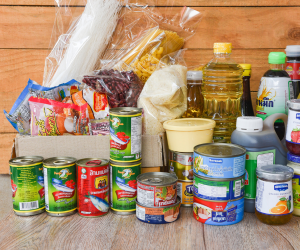
Fully preparing for survival situations can be costly, often leading to an “all or nothing” mindset. However, you don’t need to purchase all your supplies at once. It’s entirely feasible to start small and gradually expand your arsenal over time.
Begin by focusing on acquiring enough water and food for a three-day period. You don’t even have to buy everything at once. Start by purchasing supplies for one day, then gradually stock up for the second and subsequent days. Once you have achieved a three-day supply, you can proceed to augment your stockpile, aiming for a week, a month, three months, and eventually a year or more.
Approach your supply accumulation as you would a regular grocery shopping trip, purchasing items you normally use but in bulk quantities. Even without a membership to a food warehouse store, you can conveniently buy necessary items online.
Don’t limit yourself to a single supply category; aim to diversify your purchases across various areas, ensuring a well-rounded inventory. Rotate through each category and repeat the process to gradually build your supplies.
As you embark on your prepping journey, create a list categorizing the areas you need to cover, such as tools, shelter, communication, purification, and heat. In terms of tools, gradually stock up on items like knives, self-defense weapons, multi-tools, axes, binoculars, shovels, paracord, flashlights, fishing gear, fire starters, manual can openers, and cast iron pans.
For shelter, consider acquiring Mylar emergency thermal blankets, sleeping bags, tarps, tents, and weather gear like ponchos and rain boots. Include purification methods in your supplies, such as filters or water purification tablets, to ensure access to safe drinking water.
Tip #5: Buying at Opportune Times for Savings
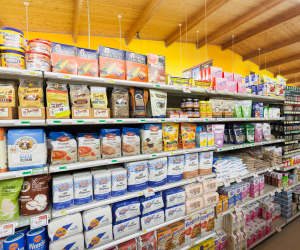
During times of crisis, panic often grips the masses, driven by sensationalized media coverage. This panic leads to increased demand, and retailers respond by inflating prices. To avoid overpaying, timing your purchases strategically becomes crucial.
Avoid buying prepper supplies during periods of heightened panic and media-induced frenzy. Instead, focus on purchasing when life is relatively calm and stable. This way, you won’t fall victim to inflated prices driven by fear and desperation.
However, there are also opportune times to buy essential supplies—during sales events. Throughout the year, retailers offer sales on special occasions like Black Friday, Cyber Monday, and other holidays. Keep a keen eye on these events, especially for high-ticket items. Take advantage of discounts, both in-store and online, to secure the supplies you need at more affordable prices.
It’s wise to keep an updated checklist of your needed supplies with you at all times. By being prepared, you can take advantage of sales, discounts, and promotions as they arise, ensuring significant savings in your prepping endeavors.
Frequently Asked Questions
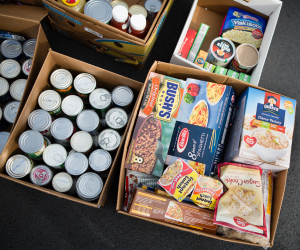
Can I really prep effectively on a tight budget?
Remember that we all have to start somewhere. Therefore yes, with careful planning and prioritization, you can build a solid prepping pantry with food, water, gear and supplies without breaking the bank. The key is to remember that this is not a race. Don’t get distracted by all of the fancy gear and gadgets on the market. Prepping is more about learning and educating yourself on survival skills, bugging out, food storage, and much more.
How do I determine which items are essential for prepping?
Most of the time, you will need to start with food and water storage. You can’t survive long without water (only 3 days they say) and only a few weeks completely without food. Therefore, I would tell you to focus on having enough food and water for each one of your family members to last 3-6 months. You are the only one who can determine how much food you have stored depending on which type of disaster you are preparing for.
Where can I find affordable prepping supplies and equipment?
Look for online discounts, second-hand stores, garage sales, and community sharing platforms. Also, consider DIY solutions and repurposing items you already own. But most of all, one of the best places to go is to the Dollar Store or a 99 cents store in your area. They have great products for super cheap! I get a lot of my dog food for my dog’s prepping supplies at the Dollar Store!
What are some unconventional prepping strategies that can save money?
Foraging for wild edibles, DIY renewable energy solutions, bartering and trading skills, and building a sustainable garden are all cost-effective ways to enhance your prepping efforts. These are skills you will read about as you continue on your journey. Again, stick to the basics for now and worry about the out-of-the-box strategies later.
Final Thoughts
Survival and prepping should be a priority for every household, regardless of income level. Disastrous situations spare no one, and being prepared is essential for the safety and well-being of yourself and your loved ones. Remember, even small steps toward prepping can make a significant difference.
Approach prepping on a budget with careful planning and a systematic approach. Make a plan, start small, and build gradually. Prioritize essential items like food, water, and communication devices. Be selective with your splurges, investing in durable bug out bags and reliable communication tools while being mindful of unnecessary features.
Bulk buying is your ally for cost savings, allowing you to secure supplies at reduced prices. Take advantage of sales, discounts, and coupons to maximize your resources. By being aware of opportune times to buy, you can avoid overpaying and stretch your prepping budget further.
Remember, no amount of prepping is too small. Every little step you take brings you closer to being prepared for whatever challenges life throws your way. So start today, be proactive, and build your prepping arsenal gradually. With proper planning, resourcefulness, and determination, you can prep on a budget without compromising your preparedness for the future.
